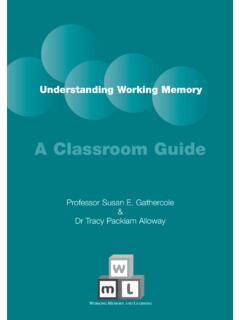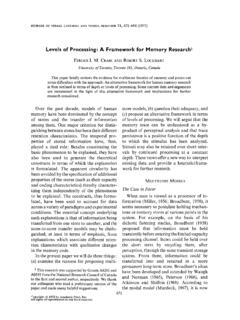Transcription of Word Length and the Structure of Short-Term Memory
1 JOURNAL OF VERBAL LEARNING AND VERBAL BEHAVIOR 14, 575-589 (1975) Word Length and the Structure of Short-Term Memory ALAN D. BADDELEY Medical Research Council, Applied Psychology Unit AND NElL THOMSON AND MARY BUCHANAN University of Stifling, Scotland A number of experiments explored the hypothesis that immediate Memory span is not constant, but varies with the Length of the words to be recalled. Results showed: (1) Memory span is inversely related to word Length across a wide range of materials; (2) When number of syllables and number of phonemes are held constant, words of short temporal duration are better recalled than words of long duration; (3) Span could be predicted on the basis of the number of words which the subject can read in approximately 2 sec; (4) When articulation is suppressed by requiring the subject to articulate an irrelevant sound, the word Length effect disappears with visual presentation, but remains when presentation is auditory.
2 The results are interpreted in terms of a phonemically-based store of limited temporal capacity, which may function as an output buffer for speech production, and as a supplement to a more central working Memory system. Miller (1956) has suggested that the capacity of Short-Term Memory is constant when measured in terms of number of chunks, a chunk being a subjectively meaning- ful unit. Because of the subjective definition of a chunk, this hypothesis is essentially irrefutable unless an independent measure of the nature of a chunk is available. Typically this problem has been avoided by making the simplifying assumption that such experi- menter-defined units as words , digits, and letters constitute chunks to the subject.
3 Hence, although Miller's hypothesis is not refutable in the absence of an independent measure of a chunk, it is meaningful to test a weaker version, namely that the capacity of Short-Term Memory is a constant number of We are grateful to the Social Science Research Council and the Medical Research Council for financial support. We thank Ronald Bidgood for running Experiment VII, Rob Baker for phonetic advice, and Graham Hitch for many useful discussions. Dr. Baddeley's address is: Medical Research Council, Applied Psychology Unit, Cambridge, CB2 2EF, England. Copyright 1975 by Academic Press, Inc.
4 575 All rights of reproduction in any form reserved. Printed in Great Britain items, where items are defined experimental units. words represent one commonly ac- cepted type of item, and in this case, the chunking hypothesis would predict that the capacity of Short-Term Memory , as measured in words , should be constant regardless of the size or duration of the words used. A number of studies testing this hypothesis have used the recency effect in free recall as an estimate of Short-Term Memory capacity. Craik (1968) found no reliable effect of word Length on performance in the free recall of separate groups of words comprising one to five syllables.
5 This invariance held true whether performance was measured in terms of either raw scores, or estimates of primary Memory and secondary Memory components. This result was replicated and extended by Glanzer and Razel (1974) who observed a recency effect which was constant when measured in number of items, even when an item comprised a whole proverb rather than a single word, They concluded from their study that Short-Term or primary Memory 576 BADDELEY, THOMSON AND BUCHANAN has a capacity of two items regardless of item duration or complexity. Miller's generalization, however, was based on the Memory span paradigm, and it is questionable whether recency and span de- pend on the same Memory mechanisms.
6 There is indeed a growing body of evidence suggesting that the recency effect in free recall is basically unrelated to Short-Term Memory as measured by Memory span. Such evidence includes: (1) Craik's (1970) observation that a subject's Memory span correlates more highly with the secondary Memory than the primary Memory component of free recall. (2) Memory span shows clear evidence of speech coding, being impaired by both phonemic similarity (Conrad, 1964; Baddeley, 1966) and articulatory suppression (Levy, 1971). This is not the case for the recency effect in free recall which is unaffected by either phonemic similarity (Craik & Levy, 1970; Glanzer, Koppenaal, & Nelson, 1972) or articulatory suppression (Richardson & Baddeley, 1975).
7 (3) Baddeley and Hitch (1974) have shown unimpaired recency in free recall for subjects performing a concurrent Memory span task involving the retention of a sequence of six digits. Since the Memory span task did not interfere with recency, it is difficult to main- tain the view that the two tasks are based on the same limited-capacity system. Studies investigating the effect of word Length on Memory span do not in general support the weak version of Miller's hypo- thesis. Thus, unpublished work by Laughery, Lachman, and Dansereau (Note 1) and by Standing, Bond, and Smith (Note 2) have reported poorer performance in a Memory span task when longer words are used.
8 Mackworth (1963) found a high correlation between reading rate and Memory span for a wide range of materials, including pictures, letters, digits, shapes, and colors. This result could be interpreted in terms of word Length as a determinant of Memory span, with reading rate providing an indirect measure of word Length . The situation is, however, complicated by the fact that subjects in some cases were asked to label pictures, and in others to read words so that it is not clear whether the result is due to articulation time or to difficulty in retrieving the correct verbal label. Watkins and Watkins (1973) present the clearest published evidence for an effect of word Length on Memory span, in a study primarily concerned with the modality effect.
9 They found evidence for a word Length effect on earlier serial positions, but observed that the modality effect (the enhanced recall of auditorily presented items) did not interact with word Length . They suggest that the word Length effect observed may have been due to the greater difficulty of perceiving their four-syllable words which were presented at a 1/sec rate. These studies do not support the hypothesis that Memory span capacity is a constant number of items. However, it is always possible to save the item-based hypothesis by questioning the assumption that words con- stitute items.
10 Given evidence that Short-Term Memory is a speech-based system, it could be reasonably argued that its capacity should be measured in more basic speech units such as syllables or phonemes. The experiments that follow aim first to study the influence of word- Length on Memory span, secondly to explore the relative importance of number of syllables and temporal duration of a word as determinants of span, and thirdly to explore the implications of this for the question of whether the underlying Memory system is time-based or item-based. EXPERIMENT I This study compared the Memory span of subjects for sets of long and short words of comparable frequency of occurrence in English.





